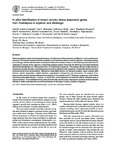Por favor, use este identificador para citar o enlazar este ítem:
http://www.alice.cnptia.embrapa.br/alice/handle/doc/926644Registro completo de metadatos
| Campo DC | Valor | Lengua/Idioma |
|---|---|---|
| dc.contributor.author | SOARES-CAVALCANTI, N. N. | pt_BR |
| dc.contributor.author | BELARMINO, L. C. | pt_BR |
| dc.contributor.author | KIDO, E. A. | pt_BR |
| dc.contributor.author | WANDERLEY-NOGUEIRA, A. C. | pt_BR |
| dc.contributor.author | BEZERRA-NETO, J. P. | pt_BR |
| dc.contributor.author | CAVALCANTI-LIRA, R. | pt_BR |
| dc.contributor.author | PANDOLFI, V. | pt_BR |
| dc.contributor.author | NEPOMUCENO, A. L. | pt_BR |
| dc.contributor.author | ABDELNOOR, R. V. | pt_BR |
| dc.contributor.author | NASCIMENTO, L. C. | pt_BR |
| dc.contributor.author | BENKO-ISEPPON, A. M. | pt_BR |
| dc.date.accessioned | 2015-08-20T05:51:50Z | - |
| dc.date.available | 2015-08-20T05:51:50Z | - |
| dc.date.created | 2012-06-19 | pt_BR |
| dc.date.issued | 2012 | pt_BR |
| dc.identifier.citation | Genetics and Molecular Biology, Ribeirão Preto, v. 35, n. 1, suppl., p. 315-321, May 2012. | pt_BR |
| dc.identifier.uri | http://www.alice.cnptia.embrapa.br/alice/handle/doc/926644 | pt_BR |
| dc.description | Plants experience various environmental stresses, but tolerance to these adverse conditions is a very complex phenomenon. The present research aimed to evaluate a set of genes involved in osmotic response, comparing soybean and medicago with the well-described Arabidopsis thaliana model plant. Based on 103 Arabidopsis proteins from 27 categories of osmotic stress response, comparative analyses against Genosoja and Medicago truncatula databases allowed the identification of 1,088 soybean and 1,210 Medicago sequences. The analysis showed a high number of sequences and high diversity, comprising genes from all categories in both organisms. Genes with unknown function were among the most representative, followed by transcription factors, ion transport proteins, water channel, plant defense, protein degradation, cellular structure, organization & biogenesis and senescence. An analysis of sequences with unknown function allowed the annotation of 174 soybean and 217 Medicago sequences, most of them concerning transcription factors. However, for about 30% of the sequences no function could be attributed using in silico procedures. The establishment of a gene set involved in osmotic stress responses in soybean and barrel medic will help to better understand the survival mechanisms for this type of stress condition in legumes. | pt_BR |
| dc.language.iso | eng | eng |
| dc.rights | openAccess | eng |
| dc.subject | Stress-responsive genes | pt_BR |
| dc.title | In silico identification of known osmotic stress responsive genes from Arabidopsis in soybean and Medicago. | pt_BR |
| dc.type | Artigo de periódico | pt_BR |
| dc.date.updated | 2015-08-20T05:51:50Z | pt_BR |
| dc.subject.thesagro | Soja | pt_BR |
| dc.subject.thesagro | Genoma | pt_BR |
| dc.subject.thesagro | Gene | pt_BR |
| dc.subject.thesagro | Stress | pt_BR |
| dc.subject.nalthesaurus | Soybeans | pt_BR |
| dc.subject.nalthesaurus | Genes | pt_BR |
| dc.subject.nalthesaurus | Plant stress | pt_BR |
| dc.subject.nalthesaurus | osmotic stress | pt_BR |
| riaa.ainfo.id | 926644 | pt_BR |
| riaa.ainfo.lastupdate | 2015-08-19 | pt_BR |
| dc.contributor.institution | NINA M. SOARES CAVALCANTI, UFPE; LUIS C. BELARMINO, UFPE; EDERSON A. KIDO, UFPE; ANA C. WANDERLEY NOGUEIRA, UFPE; JOÃO P. BEZERRA NETO, UFPE; RAFAELA CAVALCANTI LIRA, UFPE; VALESCA PANDOLFI, UFPE; ALEXANDRE LIMA NEPOMUCENO, SRI; RICARDO VILELA ABDELNOOR, CNPSO; LEANDRO C. NASCIMENTO, UNICAMP; ANA M. BENKO-ISEPPON, UFPE. | pt_BR |
| Aparece en las colecciones: | Artigo em periódico indexado (CNPSO)  | |
Ficheros en este ítem:
| Fichero | Descripción | Tamaño | Formato | |
|---|---|---|---|---|
| gmb.silico.v35n1s.315321.2012.pdf | 1,69 MB | Adobe PDF |  Visualizar/Abrir |









